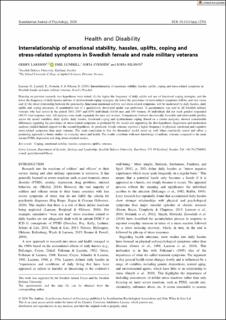| dc.description.abstract | Drawing on previous research, two hypotheses were tested: (1) the higher the frequency of daily uplifts and use of functional coping strategies, and the lower the frequency of daily hassles and use of dysfunctional coping strategies, the lower the prevalence of stress‐related symptoms will be, and vice versa; and (2) the direct relationship between the personality dimension emotional stability and stress‐related symptoms, will be moderated by daily hassles, daily uplifts and coping processes. A quantitative test of a qualitatively developed model was performed. A questionnaire was sent to all Swedish military veterans who had served in the period 2011–2015 and 1859 individuals (1,614 men and 199 women, 46 individuals did not mark gender) responded (40.5% total response rate). All analyses were made separately for men and women. Comparisons between theoretically favorable and unfavorable profiles across the model variables, daily uplifts, daily hassles, functional coping and dysfunctional coping (based on a cluster analysis), showed considerable differences regarding the prevalence of stress‐related symptoms as predicted by the model and supporting the first hypothesis. Regression and moderation analyses yielded limited support for the second hypothesis. As predicted, female veterans reported a higher frequency of physical, emotional and cognitive stress‐related symptoms than male veterans. The main conclusion is that the theoretical model stood up well when empirically tested and offers a promising approach to future studies on everyday stress and health. The results contribute with new knowledge of military veterans compared to the main stream PTSD, depression and drug abuse‐oriented studies. | |

